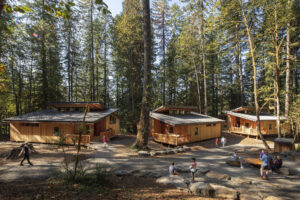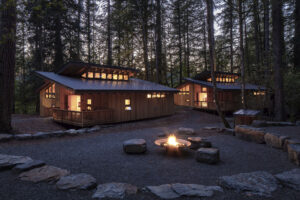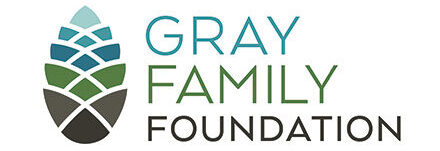In late 2023, an extensive renovation project to build eight new cabins was completed at Camp Namanu, a Multnomah Education School District (MESD) Outdoor School site. The renovation, known as The Sherwood Project, aims to increase access to outdoor learning for students across the school district by constructing ADA accessible cabins, with features that accommodate a wider range of students.
“We need to build spaces that everyone can physically come into, and get good sleep, and feel comfortable, and not have to worry about where I’m going to shower, or go to the bathroom, or plug something in,” says Janette Kunkel, the Executive Director of Camp Fire Columbia (CFC) Camp Namanu. Camp Fire Columbia is the nonprofit organization which hosts Outdoor School (ODS) at Camp Namanu. “Camp Fire is really founded on inclusion and being a welcome, open space for everyone.”
 The new cabins are accessible to students with physical mobility challenges and specific medical needs. Cabins are outfitted with sensory-friendly, low-sound lighting as recommended by an Autism specialist to accommodate neurodivergent students. There are new mattresses for the 96 beds, which use covers that do not make sounds, while still being bedbug and fluid resistant. Outlets have been added for easy plug-ins of devices like hearing aids or CPAP machines.
The new cabins are accessible to students with physical mobility challenges and specific medical needs. Cabins are outfitted with sensory-friendly, low-sound lighting as recommended by an Autism specialist to accommodate neurodivergent students. There are new mattresses for the 96 beds, which use covers that do not make sounds, while still being bedbug and fluid resistant. Outlets have been added for easy plug-ins of devices like hearing aids or CPAP machines.
The Sherwood Project’s design was guided by conversations between Camp Namanu and ODS staff and feedback from focus groups with parents and students, which was then shared with builders and architects. Restrooms are now located in cabins, so students do not have to go outside in the middle of the night to use the facilities, after focus groups revealed that this felt unsafe for some students coming from immigrant and refugee backgrounds. Feedback from Transgender and nonbinary students informed the need to include changing rooms, shower rooms, and toilet rooms as separate spaces within the cabins, to promote gender-affirming care and to remove anxiety-inducing situations.
In 2022, the Sherwood Project began with deconstructing of old cabins, salvaging those materials, clearing trees for the new cabins, and sending those trees to a mill in Estacada, where they were dry kilned and utilized to build the new cabins. With support from a Camp Maintenance grant from the Gray Family Foundation, all the necessary septic, electrical, and excavation work for the new cabins was completed.
Camp Namanu, an hour outside Portland on the Sandy River, welcomes over 2,000 6th graders every year to Outdoor School from schools across MESD. For a week, students call the cabins home and the woods become the classroom. Students learn about plants, animals, soil, and water. The staff at Camp Namanu includes camp counselors, teachers, a nurse, and a program director. They lead hikes and stargazing sessions, and go by camp names like Cicada, Truffle, and Seedling.
Outdoor school provides an immersive experience for students. According to Kunkel, being away from home puts students in a vulnerable position.
“You have to talk to people, you have to get along, you have to ask questions, and learn to advocate for yourself and use your voice,” says Kunkel. Kunkel sees relationships forming over the week between individuals who otherwise might not interact. Students explore and take risks. She attributes this to sharing cabins, getting along in close quarters, and the unique programming outdoor school offers.
“The programming that happens creates a sense of magic and awe that pulls the kids together,” says Kunkel.
CFC runs multiple after-school programs, teen programs, and summer day camps. Founded in 1910, its mission is to connect people with nature, based on the belief that these connections help to nurture relationships with ourselves and one another. Partnering with schools is a symbiotic relationship. It supports CFC’s mission to reach more students, while ODS gives students who face financial barriers to summer camps the opportunity to participate in outdoor learning. The Sherwood Project will help ODS expand its reach and serve more students, as camp facilities become more accessible, equitable, and inclusive.
“The more outreach we want to do, the more we want to work with the public school system, the more diversity we are going to have,” says Kunkel, adding that there is a great range of demographics, from race, religion, gender, and socioeconomic status. “We try to anticipate who might come to camp. What would they may bring with them in their identities that we aren’t necessarily equipped to deal with,” she says.
The answer to this question results in initiatives like the Sherwood Project, and other projects that take into account the backgrounds of students, whether they are Autistic, diabetic, or coming from the foster system. “Let’s bring in the training that helps us to be better for each of these things,” says Kunkel, capturing CFC’s commitment to making Outdoor School accessible to every student.

